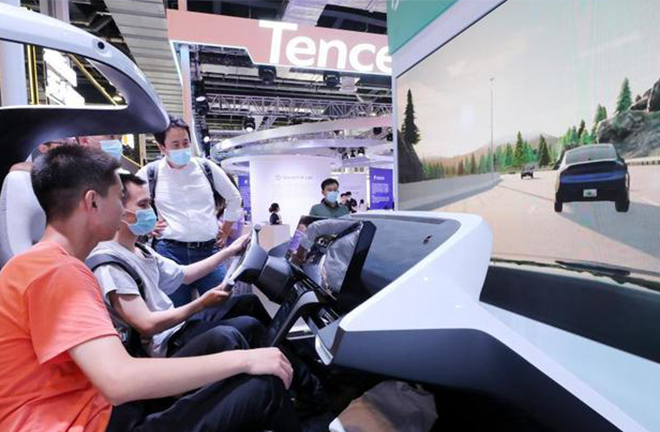Intelligent technologies reshaping economics’ research paradigms

Visitors experience simulated automated driving at World Artificial Intelligence Conference 2021 in Shanghai. Photo: XINHUA
With the development of intelligent technology, technological analysis and processing, based on big data, has created new opportunities for social science research. Big data has led to innovations in economics’ research paradigms and methods.
Research paradigm evolution
A research paradigm is the model and framework that a discipline’s academic community follows when conducting scientific research, and is the sum of basic research methods for the production and accumulation of disciplinary knowledge.
Research paradigms in economics have undergone a series of changes. At first, universities did not have independent economics departments. Economics was called “political economy” at the time, which roughly belonged under the research direction of history, philosophy, or law departments. It belonged in the category of classical economics and used academic paradigms from historical perspectives.
British economist Alfred Marshall’s Principles of Economics (1890) marked the emergence of Western neoclassical economics. Economics was separated from academic systems of history, law, and philosophy, and became an independent discipline. Economics research developed under the “hypothesis-inference” paradigm, and its academic paradigm became a “micro-macro” paradigm with an abstract micro-subject of “the homo economicus” as the logical starting point.
According to this paradigm, the behavior of microeconomic entities is solely aimed at maximizing their own interests, and autonomous decision-making will achieve partial or even global equilibrium, even if there is a deviation from equilibrium in the market. A balance can also be achieved through macroeconomic regulation and control, said Jin Bei, former director of the Institute of Industrial Economics at the Chinese Academy of Social Sciences.
Although Western mainstream economics represents an academic highland, its research results increasingly seek “conclusions” from “modeling” based on assumptions and “deductions,” Jin noted. Once it is necessary to observe and solve practical problems in the real world, this “micro-macro” paradigm lacks applicability and predictability, and cannot even predict major economic crises.
Since the 1980s, with the development of computer technology and the continuous increase of available data, empirical research based on data that tests economic theories and explores correlation and causality among data has become the most important research paradigm in economics. Empirical revolution means that economics is based on data, and uses econometrics as the main research method to explain logical relationships among economic variables. Compared to the first two research paradigms, empirical research is more in line with modern science’s research paradigms.
Transformation under big data
At present, big data, artificial intelligence, and machine learning technologies are changing people’s production and lifestyles. In the digital economy era, data is generated and recorded anytime and anywhere. Compared to traditional data, big data has the characteristics of massive scale, high speed, diversity, and accuracy. Its availability, and the application of machine learning, will lead to innovation in empirical research paradigms and research methods in economics again.
According to Hong Yongmiao, dean of the School of Economics and Management at the University of Chinese Academy of Sciences, the changes in economics’ research paradigms caused by big data can be seen in the transformation from micro-subjects’ complete rationality to imperfect rationality, from the isolated homo economicus to the socioeconomic man, from the representative homo economicus to heterogeneous micro-subjects, and from economic analysis to socioeconomic system research.
Hong believes that the availability of big data, especially high-frequency big data on the behavior of a large number of interrelated and heterogeneous microeconomic entities, enables empirical research in economics to go beyond the assumption of the isolated rational homo economicus in modern Western economics. Through textual data, it is possible to measure social psychological variables and cultural variables, such as feelings, emotions, and value judgments, so that the empirical research in economics can incorporate the “reflexivity” characteristics of the social sciences into quantitative empirical research frameworks. As such, problems that could only be analyzed qualitatively can now be transformed into rigorous quantitative analysis. Through interdisciplinary research, economics research can be placed in a larger human socioeconomic system, and systematic concepts and methods can be used to study interactions between the economy and other subsystems in the human social system.
“In the future, economics can not only perform hypothesis testing, but also problem analysis and policy simulation, and the depth and breadth of economics’ applications will be greatly improved,” said Yu Liping, a professor from the School of Statistics and Mathematics at Zhejiang Gongshang University. For example, in terms of policy effect evaluation, one of economic research’s main purposes is to infer causal relationships among economic variables, to evaluate policy effects. When making causal inferences or testing the effects of policy interventions, “counterfactuals” are often used, which means evaluating policy effects by comparing actual facts and constructed counterfactuals, and machine learning methods can be used to construct, predict, and estimate counterfactuals.
In addition, economists can also use data from high-frequency price changes to study different commodity prices and services’ short-term responses to monetary policy shocks, and shock transmission mechanisms. Economists can also extend and complement traditional econometrics’ use of structural vector autoregressive models to identify medium- and long-term responses of macroeconomic variables to monetary policy shocks, providing a basis for the government to implement macroeconomic policies accurately.
At present, China’s digital economy is developing rapidly, and massive big data resources will provide a solid foundation for Chinese economists to carry out quantitative empirical research based on big data. Economic theory is universal, but China’ s economic practices have unique features. Yu predicted that in the future, on the basis of fully learning from intelligent technologies, Chinese scholars will likely produce important theoretical innovations based on Chinese facts.
Edited by JIANG HONG

 PRINT
PRINT CLOSE
CLOSE